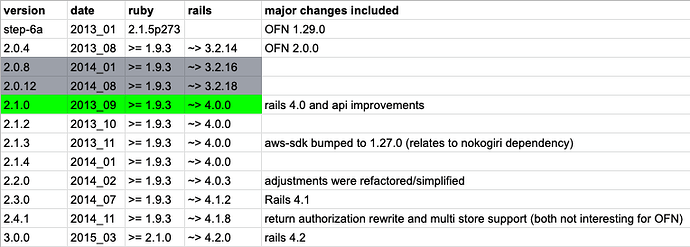From this thread we concluded that:
- we are going live with spree 2.0.4 - this will be OFN 2.0.0
- we will probably step directly to 2.1.0 (and may or may not ignore 2.0.5-2.0.12). Both 2.1.0 and 2.0.5 are from Sept 2013, that means that 2.0.5-2.0.12 are mostly backports from 2.1.x versions.
In this new thread I’d like to summarise the investigation I did around the next versions of spree, asking the 2 following questions: what does spree 2.1 and beyond bring? how difficult it will be to upgrade?
Spree Versions after 2.0.4
This is a map of the spree versions:
Analysis
We can see that 2.1.0 brings Rails 4, which is really the main point about upgrading Spree.
After 2.1.0 the upgrades will not bring as much value as v2.1 and they may still be tricky because of our “decorations” on top of Spree.
So, it looks like we should aim for spree 2.1.0 as part of this current effort and after that, we will probably focus on other areas for a while…
From the recent investigations we did (with @sauloperez), issue #3565, it looks like moving from 2.0.4 to 2.1.0 is mostly about adapting OFN code to Rails 4. I have no experience with Rails 4, so I can’t really evaluate how much time this could take…
Questions
1 - how much effort will it be to move OFN code to Rails 4?
2 - how important is it to get to rails 4.1 and beyond?
3 - is there anything I am missing about spree versions after 2.1 that would justify the upgrade?
4 - have we considered stop following Spree and just go our own way, for example, upgrading OFN to Rails 5/6 without upgrading Spree?
Opinion
re question 4, imo, that is the long game for OFN. why spend so much money getting to Spree 2.2 and beyond?
Because we have so much logic in OFN, the advantages of using a third party (with supposedly quick upgrades) is lost, so, going our own way seems to be the better approach, otherwise we will be on the “painful spree upgrade project” forever… and in 2022 we will switch to the “painful solidus upgrade project”… and we will keep on building “decorations”…
There are quite a few things about this question but imo the main one is the quality of Spree, Spree is a nice project but it’s not awesome, and given the current state of OFN, it would really be a lot easier to gradually move away from Spree and grow our own solution: undecorated, service oriented and broken in domains.




